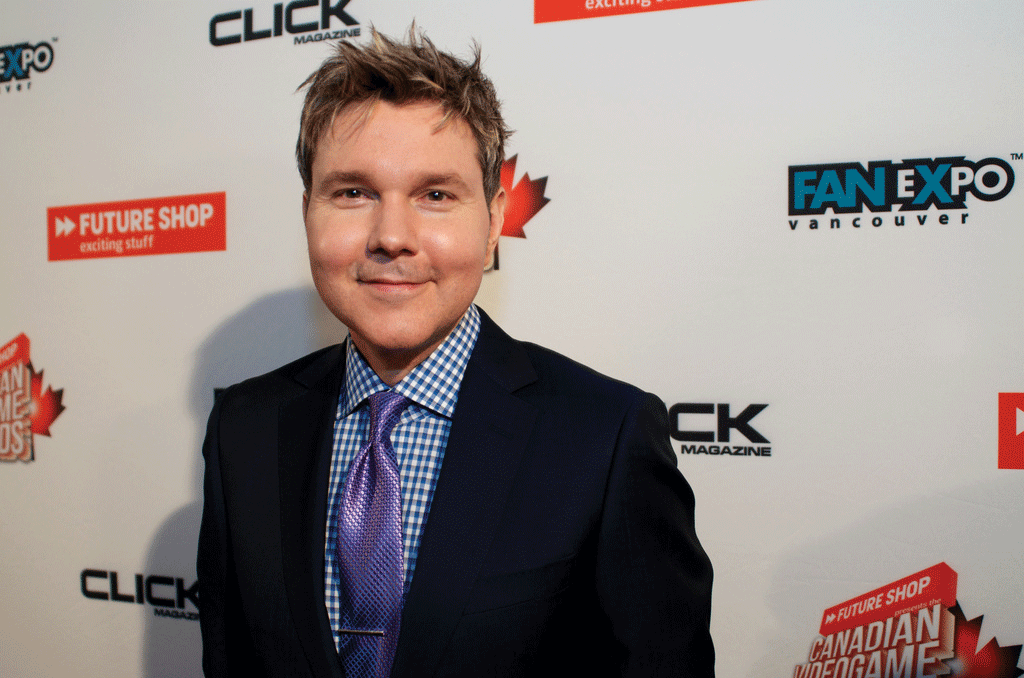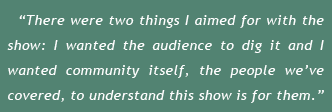By Jeremy Hannaford (Contributor) – Email
Print Edition: June 4, 2014

Victor Lucas has been in the media reviewing business for over 20 years. Lucas is the creator, producer, writer, and co-host of two half-hour Canadian television shows: The Electric Playground and Reviews on the Run — he gets to be a big kid at his job and enjoys every minute of it. Following his appearance at the Vancouver Fan Expo, Lucas spoke with Jeremy Hannaford about the surreal feeling of having a fan base, shared insights on his life and his career, and talked about what video games journalism looks like in an era where his show is one of the few still broadcast on television.
What do you think of your fans?
I don’t like calling them fans. They aren’t fans of me, per se — they’re fans of the content we talk about. They understand I’ve had this cool opportunity to go and meet the creators of this stuff and I respect them and work for them.
With your mind always on the job, how does it feel when you get the chance to meet them in person?
I’m usually in my basement playing video games, in a movie theatre, at the studio in front of a camera, or out in the field.I forget we have a fanbase out there sometimes. I have a tangential experience with Twitter that I always find interesting but it’s not the same when you are meeting people face to face. It’s very humbling.
If you were to take a different route in life, would it have been film development or game design?
I’ve done a little bit of both, actually. I was an actor at first. I wasn’t in any movies but I was on stage and in a few television shows and some commercials. I loved acting and I miss it sometimes. But I don’t like the idea of marketing myself as product; I prefer to talk about a group or an idea.
I also worked as a game designer on Nascar 2001 for Black Box Games. I had a nice little taste of game development there. I wasn’t there for very long but it gave me a lot of insight and appreciation that I constantly dip back to and build upon through my years of meeting and interviewing developers.
But I think I’m really doing what I’m supposed to be doing. We’ve been alone in this space many times throughout my career; we are really the only show out there now that does what we do. But I feel we are fighting an uphill battle with a lot of lower common denominator television out there. I like talking about imagination. I enjoy talking to creators who are driving some really cool fictional stories forward in whatever medium we cover them in. That’s what EP Daily and Reviews on the Run are all about. I feel really lucky that I get to do this but I also feel like we really have to work hard to make it as good as it can be and to never get lazy. We need to respect this opportunity.
In recent years, many game reviewing mediums have suffered. Magazines have been discontinued or gone online. Most notably, G4 television is all but gone. What do you think you and your team have done to last this long and continue to thrive?
I believe we approach this medium, games specifically, with a broader perspective. We have been inclusionary rather than exclusionary. At EP Daily, we like to broaden the focus on games, movies, television, comics, etc., because these are biggest things in the world today. We also get to talk to the creators of this material. We have a lot of great one-on-one discussions with these people and then you couple it with the footage we get out of this content. We are talking about the best kind of stuff that human beings make. It’s the most beautiful and most elaborate and I think we make a bunch of good half-hour shows. We didn’t go too niche or narrow. When I started this, I set out to make the Siskel and Ebert of games and then I realized I wanted us to be that for geek culture. Geek culture is the biggest culture, it is the number one culture. It’s the biggest money-maker and the most creative.
Do you ever hope people take inspiration from the show and try to make something of their own?
Absolutely. I built this programming to shine a spotlight on a very deserving group of people who don’t get a lot of attention. As we continue to build these shows year after year, I think we’ve inspired a lot of people to get into these fields. There were two things I aimed for with the show: I wanted the audience to dig it and I wanted community itself, the people we’ve covered, to understand this show is for them. This coverage is for the enrichment of the medium so that people would like it and respect it and to show that what we were doing was authentic.
How was it starting up the show in the beginning?
Were there any financial issues with such a big venture?
I was working as a waiter while I was going to school. I had to sell a bunch of my vintage comic books to help get me through college as well as help start the show. You have to understand that things were much more rare and expensive back then. The first computer I ever bought for the company was over $10,000 because I wanted it to be a top-of-the-line gaming computer as well as a computer that worked well with Photoshop, which was relatively new at the time. Our cameras back then were $40,000 each! Our AVID, which we used to cut our shows, was also $40,000. But it was only an offline system so we couldn’t finish the show — we had to transfer it to another company to finish off the edits. But in the end, we produced a high quality show with a can-do attitude. It was surreal when we first watched the show on television. Back then we were really just winging it and it was an absolute joy. It’s still a joy today, but when you don’t know what you’re doing, it’s nothing but joy.
Just an off question here, but do you and Keanu Reeves possess the same genomes? You look exactly the same as you did 20 years ago. Is it a good skin moisturizer or is it something more?
[Laughs] I do try to take care of my skin. I am absolutely sure I am never going to grow up — I still have the same joys I had when I was five years old. But I think that it’s also healthy living. I’ve realized that you only get one spin and you need to take care of this vessel. It’s pretty simple science.
Everyone and their grandmother can make a Youtube channel now; what do you think about this expanding medium, and do you think they are going in the right direction?
I think those people are doing the best they can and you do a little better every time you take a stab at it. I wouldn’t hire anyone on our shows in the future if they didn’t have some kind of presence with a video website, whether it be a reel or an editing project they had done. The thing that has happened with the democratization of production is that you need to find that way to express yourself. That’s the only way you will get yourself into this industry. You can’t just go to school and have some credentials and expect someone to be amazed by that. You need to point people to something you have made and to be real and authentic. Also, you need to have realistic expectations out there. The high-paying jobs of this industry that were around in 2005 are disappearing very quickly. Media is in a constant state of upheaval. It is definitely an interesting time.
 Do you think contributing to a form of volunteer media is a good means of exposure to the industry?
Do you think contributing to a form of volunteer media is a good means of exposure to the industry?
Any taste of it in any way is a good thing. The thing about decisions and directions and building dreams is that you need to make some decisions and create some paths. Whether it be stagecraft or being in the serving industry, it’s all about giving yourself education that’s real world. If you’re going to be a good journalist, you need to be working with people and hearing what they are concerned about. If you get your hands dirty, not only will you be a better communicator with different people but you’ll have a lot more respect for that opportunity when it comes. I’ve had some crap jobs in my time. I’ve worked as a waiter, I’ve worked in a video store, a record store. I even delivered newspapers for a long time. I’ve basically been working since I was 12 years old and all of that education and different directions I took helped me understand what it takes to be a producer and walk into a room full of people who have a lot of money and pitch them my ideas. Surprise yourself, that’s all you can do. I’m a father now — I never thought I was going to be a father, and it’s the most wonderful thing that’s ever happened to me. We need these big changes in our lives that shake us up and give us more dimension.
There are many celebrities out there who have written autobiographies — I would read yours in a heartbeat. You seem to be the poster child of someone always high on life. What have you done with your life and career to achieve this?
I’m in my life so it’s hard to answer that. I think one of the things is when I started this journey with the first season of Electric Playground back in 1997. Prior to that first episode, there was a lot of meetings and discussions and flights to go out and talk with other people. But I remember one night when I was walking home through Yaletown in Vancouver after leaving our production office. You have to understand, I made almost no money in the beginning. I made $13,000 during the first season of EP and that again during the second season. That’s below the minimum wage line. But as I was walking home that night, I felt like Indiana Jones. I felt like I achieved something amazing and remarkable. I remember that coin of perspective and I think to that all the time. I think about having an overview of this and appreciating this every day and being grateful for every adventure. And I don’t think you have to be on television to have that philosophy, I just think you have to not be miserable. You have to work hard to find things in your life that give you great joy and don’t settle for less.
Have you ever had a low point in your life where you felt this wasn’t what you were meant to do?
I’ll be honest with you, Jeremy: media is hard! I’ve had executives come up to Vancouver to cancel the show which meant I had to shuffle and think about how to raise money to have another season. When I started this show, I didn’t have multiple years or commitments that stretched on for a while. At first it was, “We’re going to give you the money for six episodes.” [Then,] “Okay, now we’ll give you 12 episodes,” and then we’ll try 26, 48, 52, etc. So in 2008 when Rogers came to us and told us that they wanted to turn EP into a daily show, things began to change for us because now we had become this fixture in people’s lives. We could sort of exhale for a bit but every year before that, there was always the question: is this it? Are we done? And that’s hard, man. It’s hard to hear that or even think of that. It’s a puzzle to solve and that’s what my job as a producer is: I have to solve the puzzles.
I’ve been having this really crystallizing thought about life because every life spins out of control and here’s the truth of it. You won’t reach out for your awards or your accomplishments. What you’ll reach out for is people. So what you need to do, regardless of what you do in life, is have a lot of people that love you and you love. It’s part of what my Mom taught me; she made me realize every human being has an immense amount of power and an ability to create space and that we all matter to people and to ourselves.
This interview has been edited for length and clarity. The full interview in audio format is available on CIVL Radio’s “Listening to the Movies” on Youtube.


